'Apokries' Carnival
 Sunday 26th February 2023 is the highlight of the Carnival period throughout Greece. Starting twenty days before, Carnival is an annual celebration dedicated to the worship of Dionysus, the ancient god of wine, intoxication, fun and fertility. Carnival became popular in Greece during the Venetian period in the 13th to 18th centuries, with a strong Venetian influence evident in the costumes and masks on display. The main characteristic of Carnival is disguising and wearing costumes and masks that offer anonymity and freedom of expression, a feast of fun celebrated all over the country with masquerades and parties. Ermioni celebrates the Carnival with events and parties over two weekends, but the highlight within Ermionida is the Regional Carnival Parade held in Porto Heli on Sunday afternoon.
Sunday 26th February 2023 is the highlight of the Carnival period throughout Greece. Starting twenty days before, Carnival is an annual celebration dedicated to the worship of Dionysus, the ancient god of wine, intoxication, fun and fertility. Carnival became popular in Greece during the Venetian period in the 13th to 18th centuries, with a strong Venetian influence evident in the costumes and masks on display. The main characteristic of Carnival is disguising and wearing costumes and masks that offer anonymity and freedom of expression, a feast of fun celebrated all over the country with masquerades and parties. Ermioni celebrates the Carnival with events and parties over two weekends, but the highlight within Ermionida is the Regional Carnival Parade held in Porto Heli on Sunday afternoon.
The Carnival period, known as Apokries in Greek, traditionally begins sixty days before the Greek Orthodox Easter, and climaxes on the weekend before Kathara Deftera, Clean Monday (Ash Monday) the first day of Easter Lent, Sarakosti*. Kathara Deftera is a day families traditionally spend the day outdoors, flying kites and eating non-meat foods. The name Apokries means abstention from meat, because after the Sunday celebrations finish, the long 40-day period of fasting begins until midnight of Easter Saturday.
The biggest Carnival that is organised in Greece is held in the Peloponnese city of Patras, which returns after a three year ban due to Covid-19 restrictions, with large popular Carnivals held in Xanthi, Kerkyra and Rethymnon on Crete. The Patras Carnival is the largest event of its kind in Greece and one of the biggest in Europe. A total of 139 themed decorated floats and giant carts displaying colourful papier-mâché figures are expected to take part through the city streets for a weekend of parades and parties.
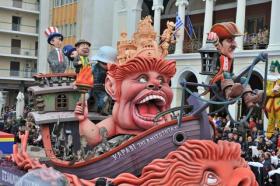

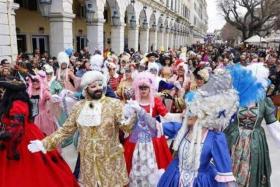
Although most Greeks celebrate the Apokries, there are also those who are replicating the ancient Greek worship of Dionysus through Phallephoria. Several modern day Christian traditions borrow from old rituals that originated thousands of years ago, and the procession of Phallephoria is one of them. The procession through the historic centre of Athens, effectively a worship of the phallus and fertility, is accompanied with ancient bagpipes, flutes and beating drums. Phallephoria 2023 is a re-enactment of the original tradition where people dress up as Silenus, Satyrs, Maenads, Nymphs and Hours and brighten up the chilly nights with their boisterous shenanigans. Phallephoria is a distinct cultural folk event that since 2014 had overwhelmed the centre of Athens thanks to the efforts of the Association for the Research & Study of Hellenic Culture.
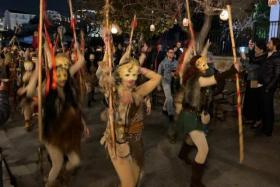
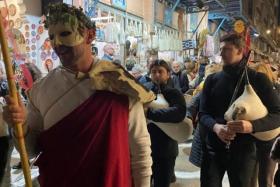
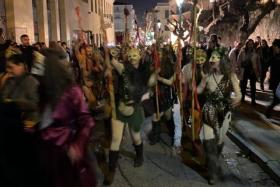
*Monday 27th February is Sarakosti (Clean Monday) which brings the Apokries Carnival celebrations to an end, inviting everyone to leave behind the 'sinful' attitudes associated with Carnival festivities. It's a national holiday across Greece and special events and activities take place in all towns and villages. Sarakosti, the period of Lent before Orthodox Easter, takes its name from Tessaracoste, which comes from the word forty, which is the forty days until Palm Sunday weekend and one more week until Easter day makes a total of 49 days of 'fasting'. During this period, the faithful fast so that their bodies and spirits are 'cleaned' to prepare for accepting the Resurrection. During Sarakosti, no meat or dairy food is eaten. Lenten food usually consists of plenty of olives, taramasalata, halva, vegetables, legumes and seafood such as calamari, octopus, shrimps oysters, cuttlefish, mussels, lobsters, etc. Fish is prohibited except on two occasions, the Annunciation of the Virgin Mary on 25th of March and Palm Sunday.